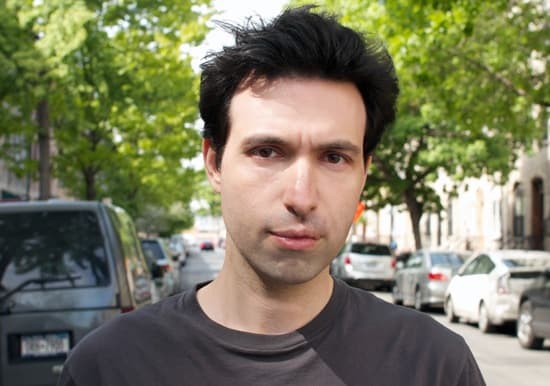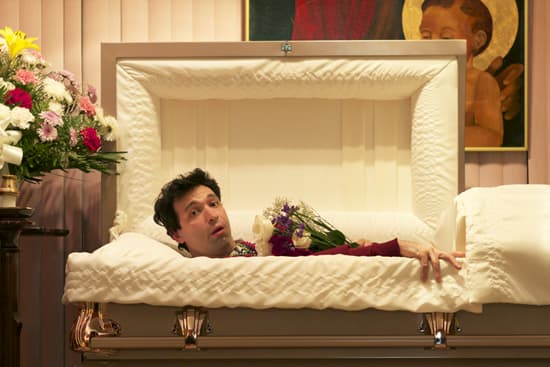Advertisement
Alex Karpovsky of 'Girls' Returns To BU Waving 'Red Flag'
The HBO hit series "Girls" not only made a star of creator Lena Dunham, but has been a springboard for the rest of the cast, including Alex Karpovsky, who plays the show’s curmudgeonly barista, Ray Ploshansky. But when BU alum and Newton, Mass., native Karpovsky (UNI’97) isn’t stealing scenes delivering frank advice to the four female leads, he spends his time writing, producing, directing, and starring in his own work, which includes five feature films.
His most recent film screened at the LA Film Festival. "Red Flag" chronicles the misadventures of an independent film director. Karpovsky plays the main character, who in metacomedy fashion is named Alex Karpovsky. Dumped by his longtime girlfriend because he won’t marry her, the character travels to college campuses and art house theaters screening his film. A New Yorker profile of the real-life Karpovsky says he “shows promise of becoming his generation’s Woody Allen, a deadpan noticer of indignity.”
Tomorrow, Karpovsky will be on campus to talk about and screen "Red Flag" as part of the Cinematheque series, a College of Communication program that brings accomplished filmmakers to campus to screen and discuss their work.
Karpovsky, who also appeared in last year’s critically acclaimed Coen brothers film "Inside Llewyn Davis," spoke with BU Today about his BU connections, his feelings about the season three finale of "Girls," and what it’s like to work as an independent filmmaker.
BU Today: You are a BU alum, and your father, Mark Karpovsky, is a College of Engineering professor of electrical and computer engineering. Are you looking forward to returning to campus?
I’m really excited; I haven’t been to Boston in a year. I go back a few years with Cinematheque curator Gerry Peary, a COM film and television lecturer. He showed my first movie — "The Hole Story" — seven years ago at the Cinematheque. It’s nice to come full circle in a sense. I’ve met a lot of cool filmmakers who were BU students at that time, including the Safdie brothers, who I’ve since had a pretty nice friendship with.
What did you study at BU?
I was in the University Professors Program, so we didn’t really have majors, but you wrote a final thesis. I wrote my thesis on something that was close to anthropology, philosophy, and psychology. And I ended up going to grad school at Oxford University for anthropology.
How did those interests morph into an acting career?
I don’t know if there was a clean morph. In grad school in England I started doing some acting in comedies and plays and writing some plays. I took a leave of absence, because it was something I was particularly interested in and willing to explore. I never went back to grad school. I can’t really say that a particular academic discipline led to acting or writing.
When did you first meet Lena Dunham?
I made a documentary called "Trust Us, This Is All Made Up," which was my third feature-length film. It played at the South by Southwest Festival in 2009, and Lena was there with her movie "Creative Nonfiction." I bumped into her through a mutual friend and we clicked; we both appreciated the other’s sense of humor. We stayed in touch and shared a few other projects with one another. A few months later she put me in her movie "Tiny Furniture," which in some ways opened the door for "Girls," and she brought some of us from "Tiny Furniture" into the world of "Girls."

What is it like being part of the cultural phenomenon "Girls" has become?
It’s wonderful. Because Lena wears so many hats on the show — producer, creator, writer, director, star — so much of the vibe on set reverberates from her. Because she is so easygoing, fun, and generous, it makes for a really fun shooting environment. On top of that, we have a lot of faith in the show and faith in Lena’s vision and sensibility. And we also have some room to make the characters our own and add our own creative contributions to the equation. It’s great that people are talking about the show, and it’s a source of enthusiasm for people. It’s pretty special.
Have you made any creative contributions to your character, Ray Ploshansky?
Nothing too sweeping or fundamental. If there is time after we’ve gotten all the takes that are needed, we can try a different line here or a different choice there. It’s small cosmetic things like that that sometimes help and give the editor choices in postproduction. I’m not a writer on the show, so I don’t really contribute to Ray’s story arc or backstory.
What was your reaction to the "Girls" season three finale, where Ray refuses Shoshanna’s plea to get back together?
We get scripts sent to us a few weeks before we shoot, and then we have a table reading, where we do a dry run. A lot of things change on the show. One of the reasons why I think the show has a vibrancy to it is because it is able to adapt. Lena spends time with the scripts, and there’s flexibility in the creative process. That’s a long way of saying that I’ve learned to not fall in love with things that have been presented to me, because sometimes they change quite drastically.
I can’t remember the first time I read that scene; I’ve stopped paying attention to stuff like that because I don’t want to get hurt by falling in love with something.
Who do you think is better for Ray — Marnie or Shoshanna?
That’s a good question. I’m not sure. I guess this is a safe answer, but they both have certain qualities. I think in the long term Shoshanna might be the slightly better fit, based on sensibility — I think there’s a greater one between Ray and Shoshanna. I could also make an argument that their differences are greater than Ray’s and Marnie’s. So it’s hard to say. I think that if Ray and Shoshanna have a sit-down and really make a concerted effort, there is a greater chance of it working out. I don’t know if Ray and Sho are really willing to go there.
You will be screening and discussing "Red Flag" tomorrow. What about your life made it possible for you to write, direct, and star in the film?
Everything. The movie is very autobiographical in many ways. It’s about a filmmaker on tour who gets into a series of misadventures. It’s my fifth movie. I know the world of low-budget independent filmmaking pretty well, perhaps too well. That comes from years of showing my movies.
To back up a bit, "Red Flag" is largely about a filmmaker who takes a movie he’s made on the road, on a tour of the South. The movie that is on tour is "Woodpecker," and that’s a movie I really made in 2006, and I really did go on this tour, and we really did shoot "Red Flag" while we were on the tour. So all of the screenings and venues you see in the movie were real venues where we were showing "Woodpecker".
That’s a direct extension of my personal experience. The main character in the movie is called Alex Karpovsky — he’s the guy that’s introduced and comes on the stage after "Woodpecker" plays. I feel like I’m playing a pretty amplified or characterized version of myself. A lot of my neuroses, insecurities, delusions, frustrations are really magnified in the film for comedic effect. To conclude this answer, it’s coming from personal experience, but I feel a lot of it is exaggerated for dramatic and comedic value.
Advertisement

What was the budget for "Red Flag?
The budget was very small. I don’t want to give you a number, but it probably cost — I’m trying to put it into BU terms — what a semester’s lodging at Warren Towers might cost.
How did you work around such a tight budget?
We had a one-person crew who did camera and sound simultaneously. We didn’t have any lights, and all of our microphones were wireless, so no one was needed to hold the boom. We owned the little cameras we used. Most of our locations were stolen or we shot in public places. So really 90 percent of our budget was used to fly my actors down South and lodge them and feed them. It was just a matter of keeping everyone happy and fed.
How long did it take to produce the film?
I took about three or four months to write it, and we shot it over a period of two weeks. And then we edited it for about 10 months part-time — a week on and then a week off type of thing — and a week of reshoots. Altogether it took about a year and a half. But there were many breaks; I did a season of "Girls" in one of those breaks.
What’s next for you?
I’m trying to act in projects that are interesting and fun. I’m also trying to write other things, like an idea for a TV show. I have some ideas for films, one of which will take place hopefully — if it’s made — on Cape Cod next winter. If any BU students are interested in helping out, I’m looking for local assistants. I’m also enjoying the good fortune of working on a show that people are watching and that happens to shoot in New York. Not a lot of shows are shot in New York, so the fact that we’re one of them is pretty neat.
What advice do you have for students interested in filmmaking?
Go out and make movies and learn from your mistakes. Almost everyone, myself included, learns through trial and error. Right now it’s an incredibly exciting time, because the technology is cheaper and better than ever. You can make a really good-looking movie with a camera that costs $1500. Even if you don’t have that money, go to Best Buy, buy the camera, and return it within 90 days or whatever. It’s basically a free rental. I’ve certainly done that, and all my friends have done it. If you want to make movies, the excuses have pretty much evaporated in this day and age. You can learn a lot from film school, and I think it can be an important part of some people’s education — it wasn’t part of mine. I don’t say that proudly; it just wasn’t. If film school is part of your education, I think it needs to be complemented by as much experience in the field as possible. My advice is go out there, do your own stuff, help on other people’s stuff. Filmmaking is an incredibly collaborative medium, so I think the more backs you scratch, the more help you’ll receive down the road. That’s certainly what happened to me.
Alex Karpovsky speaks and screens his film, "Red Flag" tomorrow, Friday, April 4, at 7 p.m., at the College of Communication, Room 101, 640 Commonwealth Ave. The event, part of the BU Cinematheque series, is free and open to the public.